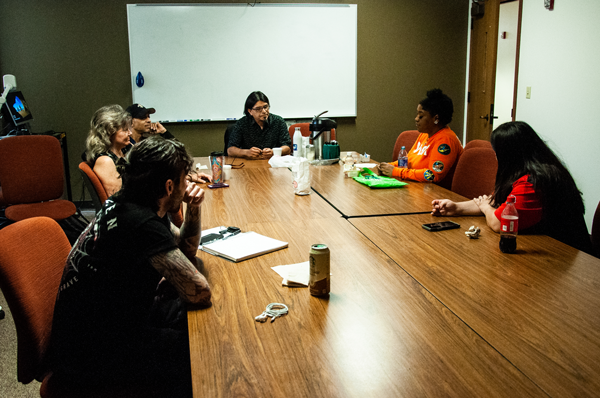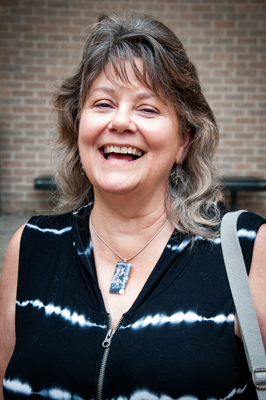
By JORDAN LACKEY
@TheEtCetera

Temperance Miller achieved clarity 23 years ago when a coworker approached her as she was dry-heaving into an office trash can after a night of heavy drinking.
“You don’t have to do this,” he told her.
“It scared the hell out of me,” she said. “Because I couldn’t drink enough to get drunk. I couldn’t get the buzz. I couldn’t get that sense of ease and comfort that they always talk about, but I sure as hell had the hangover.”
Miller said she realized before the age of 13 that she didn’t drink like most people do. The more she drank, the more she wanted, and it only got worse after years of alcohol abuse. She said she didn’t want to die the way her father did, malnourished and starved, so that a full stomach wouldn’t get in the way of a decent buzz.
She said something clicked that hung-over morning. She’s been sober since Nov. 19 1996. She’s now a substance abuse counseling major and a member of Students in Recovery.
Every Thursday, a small conference room located within the library becomes a sanctuary for Eastfield students recovering from drugs, alcohol or any other affliction.
In room L-207 from 12:30 to 1:30 p.m., the Human Services Club hosts a weekly peer recovery meeting, which can’t be found on any other campus in the Dallas County Community College District. Attendance can range from a small handful of students to upwards of 12 or more from week to week.
The smell of complimentary fresh coffee, cookies and donuts permeates the dimly lit room.
Tears fall on the wooden table as a grieving student shares the pain of a recent loss. Later, a fist hits the arm of a chair as another student voices the frustration of a stressful test. Then the philosophies of anger and acceptance are debated as the words “I’m looking for a little inspiration” seem to echo and resonate within the room.
[READ MORE: Opinion: Recovery is difficult, help can make it happen]
Depression, anxiety and mental illness are common topics of conversation. Students dealing with any problem are encouraged to share their stories and feel fellowship from a room of supportive people that may not be otherwise present in their lives.
Daniel Ramirez, professor of social work and substance abuse counseling and adviser for the Human Services Club, played a huge role in helping get these meetings established in 2016, but he said this has been a student-run and founded program all along.
He hopes this will serve as inspiration for the other campuses within the Dallas County Community College District.
Ramirez wants students to know these meetings aren’t strictly devoted to drug and alcohol recovery. They’re for anyone looking to change a behavior or habit of any kind. Everyone is welcome, and he said no topic is taboo.
“It doesn’t matter,” he said. “You could have never done drugs, and you can go into that group and find that you’re probably dealing with something similar.”
[READ MORE: Campus denies need to address drugs: Eastfield offers no drug recovery option]
Another influential person in the recent growth of the peer recovery meetings is Alan Elson, president of the Human Services Club and a substance abuse counseling major. Elson wasn’t there for the founding of Students in Recovery, but the peer recovery meetings are what inspired him to take an active role in the Human Services Club.
“It’s inspiring to see that someone can just sit down and pour their heart out,” he said. “And then in the course of doing that, come to the realization that they knew the answer all along.”
With 23 years of sobriety under her belt, Miller still struggles with her mental health and depression.
Once, after receiving a ketamine transfusion, she compared the attempts to reorganize her mind to the likes of “trying to unscramble an egg.”
Miller encourages every first-timer to come back because she knows exactly how much can be on the line for someone in the depths of recovery.
“This disease wants me dead, whether or not I drink or use,” she said. “I will self-destruct if left to my own devices. That is the nature of my disease.”
https://eastfieldnews.com/2019/05/07/a-true-comeback-20-time-felon-finds-purpose-in-charity-servitude-leadership/






